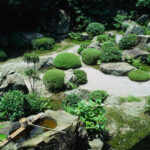Japanese garden design is known for its serene and peaceful aesthetic that has been cultivated for centuries. These gardens are carefully crafted to reflect natural landscapes and evoke a sense of harmony and tranquility. One of the key principles of Japanese garden design is the concept of wabi-sabi, which celebrates imperfection and impermanence.
One of the most characteristic features of Japanese gardens is the use of natural elements such as rocks, water, and plants. Rocks are often placed strategically to create focal points or to represent mountains, while water features like ponds and streams are used to mimic the flow of a river. Plants are carefully selected and pruned to create a sense of balance and harmony within the garden.
Another important aspect of Japanese garden design is the use of symbolism and metaphors. For example, bridges are often used to symbolize the journey from the physical world to the spiritual realm, while lanterns are used to guide visitors through the garden and illuminate the path. These symbolic elements add depth and meaning to the overall design of the garden.
Japanese gardens are also designed to be experienced in a contemplative and mindful way. Visitors are encouraged to slow down and appreciate the beauty of nature, to listen to the sound of water and wind, and to observe the subtle changes in light and shadow throughout the day. This emphasis on mindfulness and presence is an integral part of the Japanese garden experience.
In addition to their aesthetic beauty, Japanese gardens are also designed to promote a sense of well-being and relaxation. The careful arrangement of natural elements and the use of calming colors and textures create a peaceful and serene atmosphere that can help to reduce stress and promote a sense of inner peace. This focus on creating a restorative environment is one of the reasons why Japanese gardens are popular around the world.
Overall, Japanese garden design is a masterful blend of art, nature, and spirituality that seeks to create a harmonious and peaceful sanctuary for visitors to enjoy. By embracing imperfection, incorporating symbolism, and promoting mindfulness, Japanese gardens offer a unique and enriching experience that can transport visitors to a state of tranquility and inner calm.
















